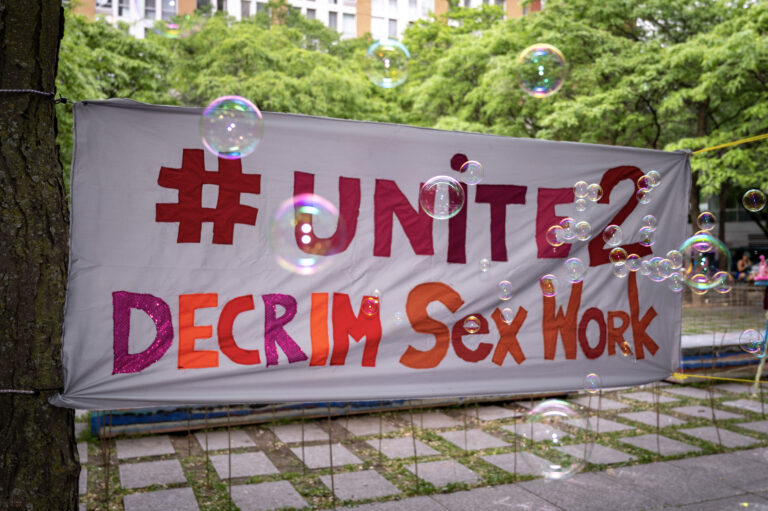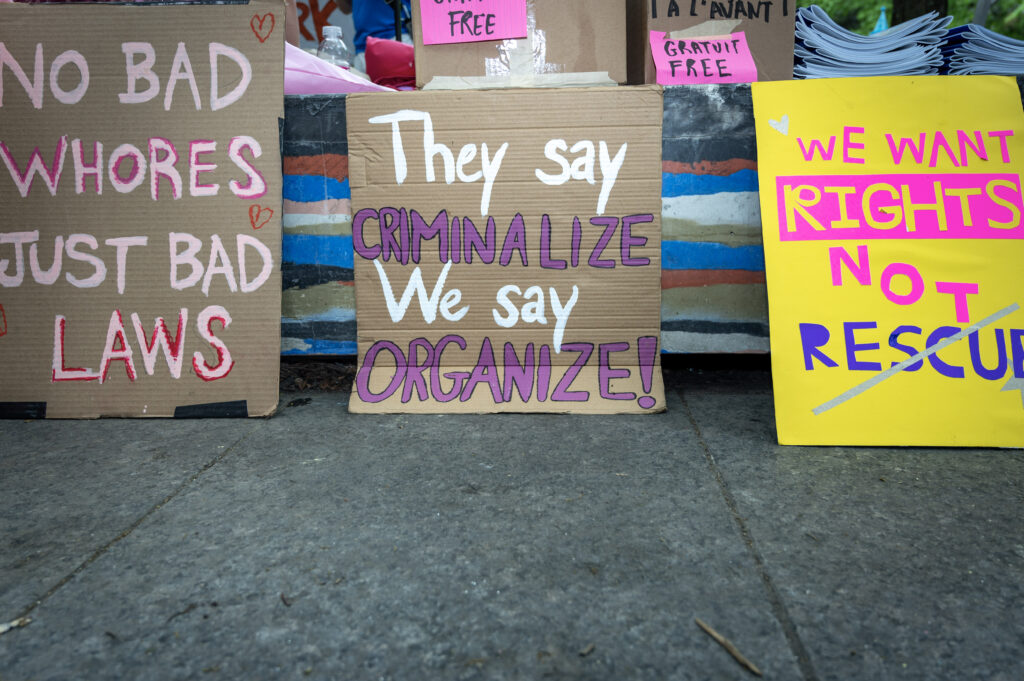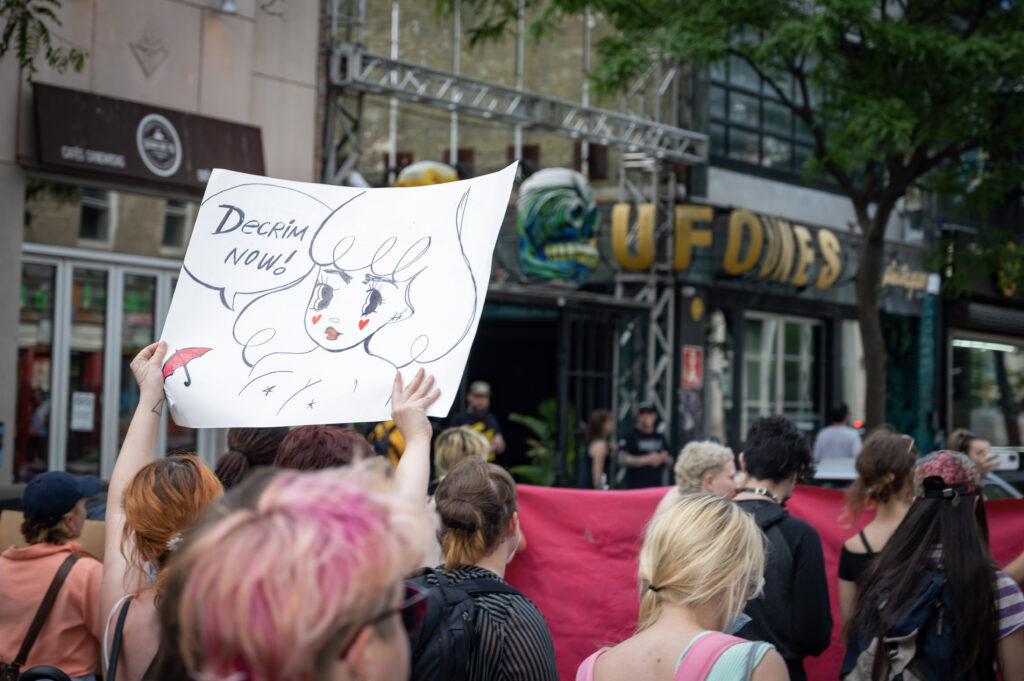A Voice for Invisible Workers
Interview with Crystal Laderas from SWAN Vancouver
Latsami & Adore Goldman
SWAN (Supporting Women’s Alternatives Network) Vancouver is an organization that promotes the rights, health, and safety of im/migrant women engaged in indoor sex work through frontline services and systemic advocacy in Greater Vancouver since 2002. Latsami and Adore from SWAC interviewed Crystal Laderas, the communication manager at SWAN, to know more about the challenges im/migrant sex workers face in their daily life as well as their demands as an organization.

SWAC: Your organization denounces how immigration laws target sex workers and how it puts them at risk. Can you explain how these laws harm sex workers?
Crystal: We recently had a woman telling us that because of the immigration ban on sex work, she barely goes out. So outside of work, she doesn’t want to tell people what she does. She even lies to them because she’s not comfortable with that. So she just stays away from all social situations and isolates herself at all times in order not to be detected, and that’s sort of how the immigration and refugee protection regulations are impacting migrant’s lives.
It bans all temporary residents like international students or somebody on a tourist visa from working at a strip club, massage business, or escort service. If you’re caught, you’re deported. This leaves people constantly on edge. If you get into a situation where you’re attacked and you want to call the police, they would run your ID and it would automatically get reported to the CBSA.
You want to go to the pharmacy to get some medication, but then they ask too many questions and they could report you to the CBSA too, and you’d be deported for trying to get some basic health care.
There are extreme cases too where you’re working at a massage business, and it gets raided by police during a trafficking investigation. There are often two outcomes for the women: say that you’re a trafficked victim, or CBSA is called to deport them as criminals. So these workers lose basic rights like access to justice and even human interaction because of some of these laws.
SWAC: What are some of the specificities related to the Asian community of sex workers you’re working with? What are their needs?
Crystal: I think a lot of their needs are just kind of based on accessing services, but a lot of the mainstream services are just not available to them. So for example, our outreach team answers a lot of calls from women who are trying to find low-barrier access to family doctors and pharmacies. We offer services in English, Cantonese, and Mandarin. So the women often ask SWAN to come with them for a health appointment so we can do translation. This is normal in the Asian and newcomer communities to have a loved one coming with you. But because the topic of working comes up in the middle of that health appointment, they prefer to have SWAN staff there with them doing the translation, so they don’t get outed to their family. Also, the staff helps with making sure the healthcare workers aren’t asking questions that they shouldn’t be to make sure that work doesn’t come up and that their immigration status doesn’t come up. We know that some health care providers also receive anti-trafficking training and again, that could result in a call to the CBSA.
We also get a lot of calls and questions about labor-related issues, and that’s where we hit some roadblocks. So if a woman’s manager is late on paying them, they’ve been scheduled for hours that they didn’t initially agree to, or they just have some dispute with a co-worker, they call us. We can try to work on solutions with them, but because the workplace is criminalized, there’s really nothing more that we can do because they can’t be protected under provincial labor regulations. At that point, if we can’t find solutions within the system, we just listen. We’re there for emotional support because sometimes, they just want somebody to talk to about this and it’s not something they can always talk to their friends about.
We’ve been accused of being traffickers just for doing normal, simple translation services that a lot of Asian and newcomer communities do for their loved ones. It’s just different in this case because they can’t have their loved ones there. So, we do have to push back on healthcare workers if they’re asking a little bit too much about the woman’s work or even status and things like that too. Like, is this absolutely necessary for this person’s health? That could keep them from being deported.

SWAC: Your organization is very critical of the sex trafficking narrative. Can you explain why viewing migrant sex workers as victims is problematic?
Crystal: It’s really frustrating because it ties into a lot of anti-trafficking narratives and how they target Asian sex workers. A lot of those campaigns or enforcement branches of the law are really driven by racist stereotypes. There’s a lot of sensationalism that’s making money off of fears and racist ideas about who’s the victim and who’s the bad guy. There’s a savior complex and religious influence and moral stuff. It’s just like a mixed bag of bullshit!
They decide who a victim is based on race, immigration status, or country of origin and not actual victimization. It’s as if they’ll push somebody who has been assaulted on the street out of the way so that they can kick down the door of a massage business and rescue Asians who don’t need your help, didn’t ask for your help and are just on shift right now wondering what the hell you’re doing here.
We really have to constantly point out that it’s not just white middle-class people who have the ability to consent to sex work, but the opposing narrative is that these women lack agency, they are powerless or are easily tricked. I think overall, the narrative is sort of a disguise created to hide what these groups are really doing, which is trying to stop a couple of adults from having sex in exchange of money, which is no one’s business.
SWAC: With all the evidence we have today and all the sex workers sharing their stories and raising their voices, why do you think the government and also society at large don’t want to change and don’t seem to want to talk about it or to hear us?
Crystal: I think at the core, it comes down to these really long-held moralistic views in our society that are outdated and sexist. The people influencing the laws have a moral agenda, and laws have been shaped by societal views, and in turn, those laws influence society, and then there’s this horrible cycle that lasts for centuries. We saw this with the recent constitutional challenge. The Ontario Superior Court justice, in his decision, wrote that “sex work is inherently exploitative” (which we know is not true). He cited Canada’s sex work laws and really echoed the arguments that were written into the preamble of the law. The preamble talks about “human dignity and social harm caused by the objectification of the human body”. We know that former conservative Minister of Justice, Peter MacKay wrote that law and that preamble. It’s as if he was there during the first exchange of money for sex, writing with a quill pen, saying “hmm… ”.
It’s so archaic and outdated, yet this is what shapes the law, and that law influences the public perception. I guess other than that it’s just maybe easier for the public to believe everybody is exploited than it is to accept that sex workers have a choice in doing this job.
SWAC: It’s interesting that it just keeps reinforcing the cycle because of the law; so a judge can easily say “Oh yeah, according to the law, it says that so it’s that” you know.
Crystal: Yeah “It must be fact!”. The law was written by somebody who had their own moral agenda, and they made it very obvious in the writing of the preamble. If you heard somebody speaking like that in public or an institution, or at a restaurant, you’d be like, “What? Where is this coming from? Why is this person telling these people what to do with their own work and their own business?”

SWAC: Migrant sex workers occupy a special place at the intersection of the migrant workers’ movement and the SWers’ movement. Is it a challenge to navigate this intersection? Have you been able to create solidarity between both movements?
Crystal: To be honest it has been really difficult because it just kind of feels like we don’t really fit anywhere. But the truth is, just like how there’s racism in the broader society, there’s also racism within the movements. So we have run into people who say “Oh, we don’t do outreach at the massage businesses because all those women are trafficked”. That’s the same racist narratives that we just talked about being repeated.
There’s also a dominant “out and proud” approach to sex work advocacy and I’m really grateful for all the activists and organizations who do this, but it does not work for the women we support. Having face-driven advocacy is not possible. I’m talking to you because I’m not a sex worker, I’m a Canadian citizen and my first language is English. Those are privileges that allow me to speak. We’re always trying to find low-barrier ways for the women to participate in our advocacy, and I can tell you that they have a lot to say, but they don’t want to be the face of a movement, they don’t want to be on camera, they don’t even want their voice recorded.
So we have been putting effort into migrant communities and alliances with them, we’ve been speaking at rallies, etc. But sex work can be new and uncomfortable for that crowd as well, and it’s important to remember that many of them can come from countries where sex work is highly criminalized; there are very harsh penalties for doing it and so that has created a lot of cultural stigmas. We try to say that these migrant sex workers are migrant workers too. They’re international students, they’re mothers, they tried to work at hotels or in hospitality where they faced racism and exploitation and left; they live in fear of deportation and family separations. So even though the work is unfamiliar, those are very common experiences and emotions felt by a lot of migrant communities. We know it’s going to take some time and understanding. We have a common goal, so we’re hoping that by fighting immigration policies rooted in racism, they can understand that and we can collectively change things. But it’s a very interesting intersection to find yourself in.
SWAC: New Zealand is often shown as the decriminalization model. Yet, 20 years later, migrant sex workers still can’t work legally. What strategy should be implemented so that the same thing doesn’t happen in Canada?
Crystal: Yeah, it’s a tough question. What happened in New Zealand wasn’t full decriminalization, as migrants are still banned from doing sex work and they face some of the same problems and risks as they would if they were working here. So I’ll just give an example: when SWAN spoke to the House of Commons committee [on the Status of Women for its study on human trafficking] this past summer, politicians admitted many of them hadn’t even heard about the migrant ban on sex work. So we have to really drive down these messages over and over and over again. Whatever the place, we do advocacy everywhere we are because even if Canada’s prostitution laws were repealed, migrants would still face the same risks. It wouldn’t change much for any of them. They could still be deported, they could still be held at the immigration detention center here in Surrey, for an indefinite amount of time, not provided a translator, traumatized, not knowing if they’re going to see their kids again. But I would just say that New Zealand was definitely a learning experience and that can’t happen here.
1. Canada Border Services Agency. ↩
2. Government of Canada. (2014). “Preamble”, Protection of Communities and Exploited Persons Act, from https://tinyurl.com/pcepacanada ↩
3. To learn more about SWAN appearances at the committee: SWAN Vancouver. (2023). SWAN Vancouver speaks to House of Commons Committee, from https://tinyurl.com/swanvancouver ↩